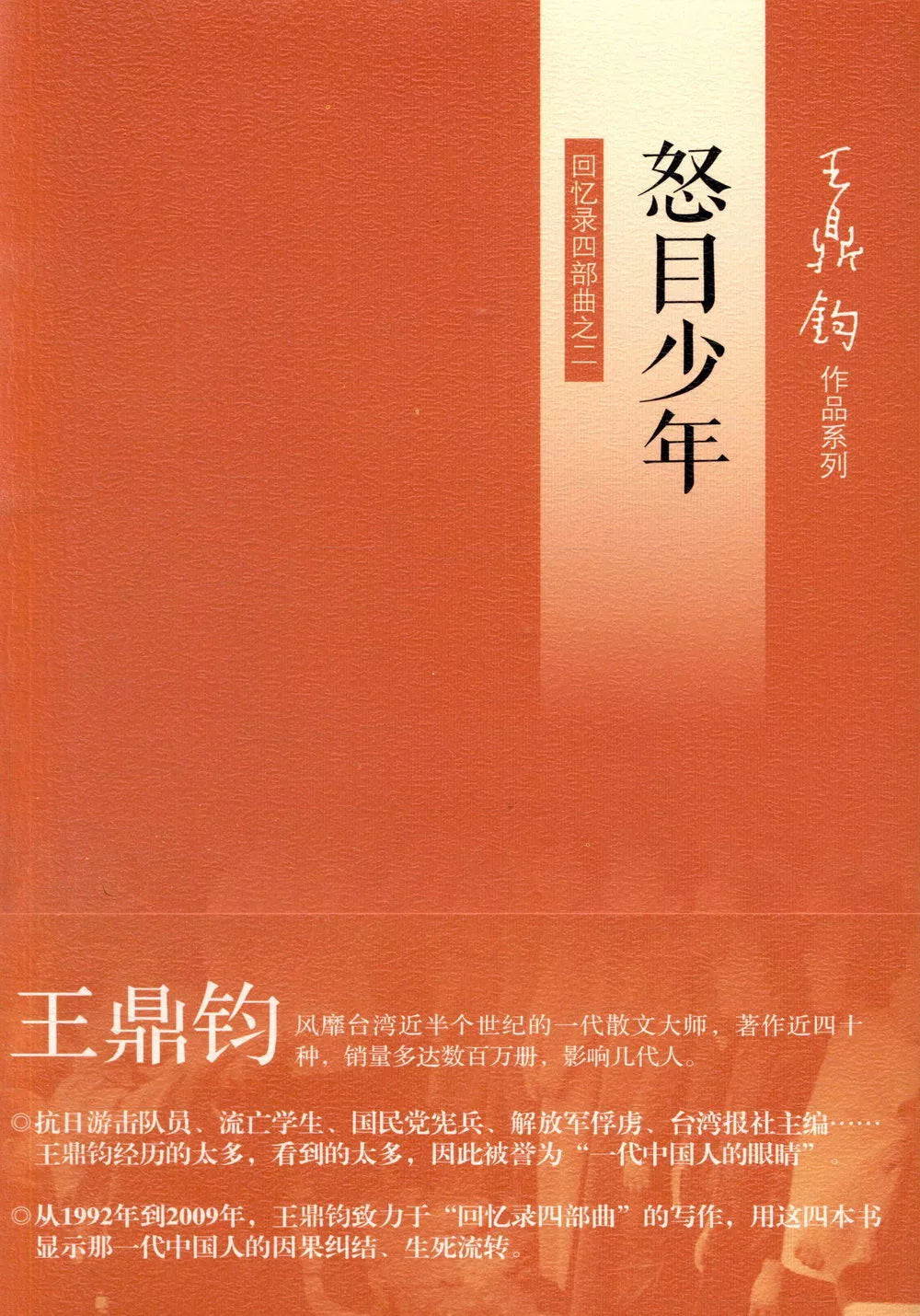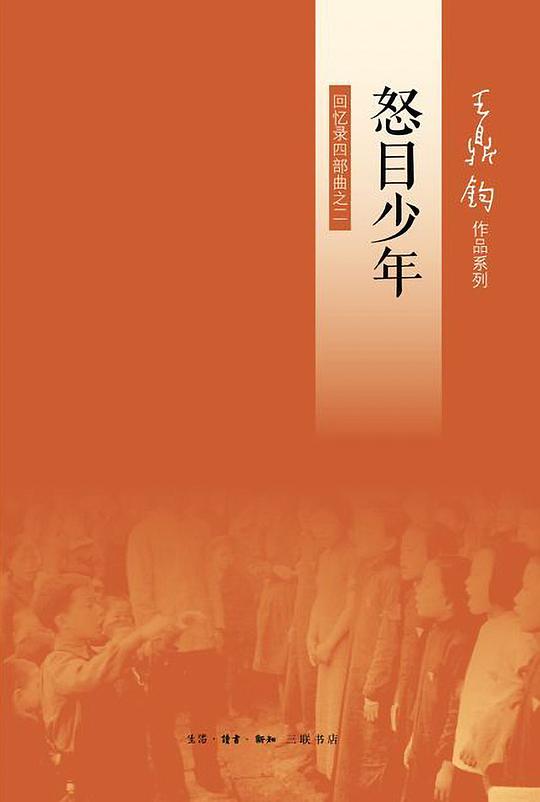1
/
of
2
Angry Boy
Angry Boy
Wang Dingjun
Regular price
$14.99 USD
Regular price
Sale price
$14.99 USD
Unit price
/
per
Out of stock
Couldn't load pickup availability
About Book
About Book
This second volume in Wang Dingjun's "Memoirs in Four Parts" chronicles the experiences, observations, and reflections of a middle school student in exile, traveling between Fuyang, Anhui, and Hanyin, Shaanxi, from the summer of 1942 to the end of the Second Sino-Japanese War in 1945. Amidst this difficult and displaced existence, the author, like a small chess piece, deeply comprehends the living conditions of the exiled students and bears witness to the fate of ordinary Chinese people. He also meticulously reveals the causes and consequences of the rise and fall of military strife, student unrest, rural self-government, and the Youth Army, as well as the complexities of society.
When Chinese people are angry, their anger sometimes boils, sometimes flares like a volcano. As the Anti-Japanese War broke out, the Chinese built up their rage, but the target of their anger shifted, first toward foreign countries and then toward their own people. … The book 'The Angry Young Man', written with the feelings, thoughts, actions, and consciousness of a young man, oscillated between these two types of anger (at foreign countries and at his own country), was composed with the help of a young man.
Life is like turning on a camera. In youth, the film is exposed to light, never developed, and stored, developing each frame as we age. The second volume of Wang Dingjun's "Memoirs in a Quartet," "The Angry Youth," captures his time as a student in exile. From the summer of 1942 to the victory of the Anti-Japanese War in 1945, an exiled middle school student wandered through Fuyang, Anhui, and Hanyin, Shaanxi. Amidst this difficult and displaced existence, he, like a small chess piece, gained a deep understanding of the exiled student's living conditions and witnessed the fates of ordinary Chinese people. He also meticulously revealed the causes and consequences of military strife, student unrest, rural self-government, the Youth Army, and the myriad aspects of society.
When people today talk about the spirit of the War of Resistance, they often simplify it to arduous struggle, which only describes the surface. Only "The Angry Young Man" captures its true meaning, and therefore reveals the truth. This is the artistic conception of a great prose writer. - Zhu Xining In an era like that where everything was shattered, all the beautiful things in the world turned into the most terrifying threats. What Wang Dingjun writes about are the scars and fears that remain in the body after emerging from that era. - Yang Zhao's book series introduction: Using a lifetime of waiting for freedom to write about the karmic entanglement and the cycle of life and death of Chinese people in the 20th century. Qi Bangyuan, Zhu Xining, Yang Zhao, Gao Hua, and Wang Qisheng recommend Wang Dingjun's four-part memoir:
Yesterday's Clouds, Angry Boy, Mountain Pass, and Literary Jianghu
"During the War of Resistance Against Japanese Aggression, I lived in Japanese-occupied areas and also in the rear areas of the war effort. During the Civil War, I served in the Nationalist Army and witnessed both the KMT at its peak and the Communist Party's complete victory. I was a prisoner and served in liberated areas. During the War of Resistance Against Japanese Aggression, I received the KMT's wartime education and was baptized by authoritarian ideology. Later, in Taiwan, swept by the tide of the times, I was reconstructed by the ideas of democracy and freedom. I have experienced great hardships and great heat, profound destruction and reconstruction... My experience is complete. I believe that God has kept me until now so that I can bear witness."
——Wang Dingjun The War of Resistance Against Japanese Aggression, Exile, Civil War, White Terror… The world was in chaos at that time, but these four memoirs have a clear thread, showing the turbulent times like the Flaming Mountain through personal experiences of separation and chaos. It reads like a chapter novel, with wonderful stories connected one after another - this is actually what the octogenarian author has earned with his youth and blood and tears!
What's remarkable is that the author doesn't write this memoir as a tearful indictment of his own blood. Instead, he uses his own experiences, thoughts, actions, and knowledge, employing the pursuit of beauty in literature, truth in history, and the search for understanding in philosophy to transform these tears into a pearl, presenting the existence of a generation and attempting to awaken modern attention to and understanding of the most important collective experiences of the Chinese people of that era. Without sensationalism or outcry, the work is calm and composed, yet it possesses an epic grandeur and soul-touching power.
"Fighting Through the Mountains and Rivers" won the United Daily News Readers' 2005 Best Book Award, "The Memoirs Quartet" was named one of the China Times' 2009 Top Ten Books, and "Literary Jianghu" won the Grand Prize at the 3rd 2010 Taipei International Book Fair.
When Chinese people are angry, their anger sometimes boils, sometimes flares like a volcano. As the Anti-Japanese War broke out, the Chinese built up their rage, but the target of their anger shifted, first toward foreign countries and then toward their own people. … The book 'The Angry Young Man', written with the feelings, thoughts, actions, and consciousness of a young man, oscillated between these two types of anger (at foreign countries and at his own country), was composed with the help of a young man.
Life is like turning on a camera. In youth, the film is exposed to light, never developed, and stored, developing each frame as we age. The second volume of Wang Dingjun's "Memoirs in a Quartet," "The Angry Youth," captures his time as a student in exile. From the summer of 1942 to the victory of the Anti-Japanese War in 1945, an exiled middle school student wandered through Fuyang, Anhui, and Hanyin, Shaanxi. Amidst this difficult and displaced existence, he, like a small chess piece, gained a deep understanding of the exiled student's living conditions and witnessed the fates of ordinary Chinese people. He also meticulously revealed the causes and consequences of military strife, student unrest, rural self-government, the Youth Army, and the myriad aspects of society.
When people today talk about the spirit of the War of Resistance, they often simplify it to arduous struggle, which only describes the surface. Only "The Angry Young Man" captures its true meaning, and therefore reveals the truth. This is the artistic conception of a great prose writer. - Zhu Xining In an era like that where everything was shattered, all the beautiful things in the world turned into the most terrifying threats. What Wang Dingjun writes about are the scars and fears that remain in the body after emerging from that era. - Yang Zhao's book series introduction: Using a lifetime of waiting for freedom to write about the karmic entanglement and the cycle of life and death of Chinese people in the 20th century. Qi Bangyuan, Zhu Xining, Yang Zhao, Gao Hua, and Wang Qisheng recommend Wang Dingjun's four-part memoir:
Yesterday's Clouds, Angry Boy, Mountain Pass, and Literary Jianghu
"During the War of Resistance Against Japanese Aggression, I lived in Japanese-occupied areas and also in the rear areas of the war effort. During the Civil War, I served in the Nationalist Army and witnessed both the KMT at its peak and the Communist Party's complete victory. I was a prisoner and served in liberated areas. During the War of Resistance Against Japanese Aggression, I received the KMT's wartime education and was baptized by authoritarian ideology. Later, in Taiwan, swept by the tide of the times, I was reconstructed by the ideas of democracy and freedom. I have experienced great hardships and great heat, profound destruction and reconstruction... My experience is complete. I believe that God has kept me until now so that I can bear witness."
——Wang Dingjun The War of Resistance Against Japanese Aggression, Exile, Civil War, White Terror… The world was in chaos at that time, but these four memoirs have a clear thread, showing the turbulent times like the Flaming Mountain through personal experiences of separation and chaos. It reads like a chapter novel, with wonderful stories connected one after another - this is actually what the octogenarian author has earned with his youth and blood and tears!
What's remarkable is that the author doesn't write this memoir as a tearful indictment of his own blood. Instead, he uses his own experiences, thoughts, actions, and knowledge, employing the pursuit of beauty in literature, truth in history, and the search for understanding in philosophy to transform these tears into a pearl, presenting the existence of a generation and attempting to awaken modern attention to and understanding of the most important collective experiences of the Chinese people of that era. Without sensationalism or outcry, the work is calm and composed, yet it possesses an epic grandeur and soul-touching power.
"Fighting Through the Mountains and Rivers" won the United Daily News Readers' 2005 Best Book Award, "The Memoirs Quartet" was named one of the China Times' 2009 Top Ten Books, and "Literary Jianghu" won the Grand Prize at the 3rd 2010 Taipei International Book Fair.
Publication Date
Publication Date
2013-01-01
Publisher
Publisher
生活·读书·新知三联书店
Imprint
Imprint
Pages
Pages
226
ISBN
ISBN
9787108042286
share



